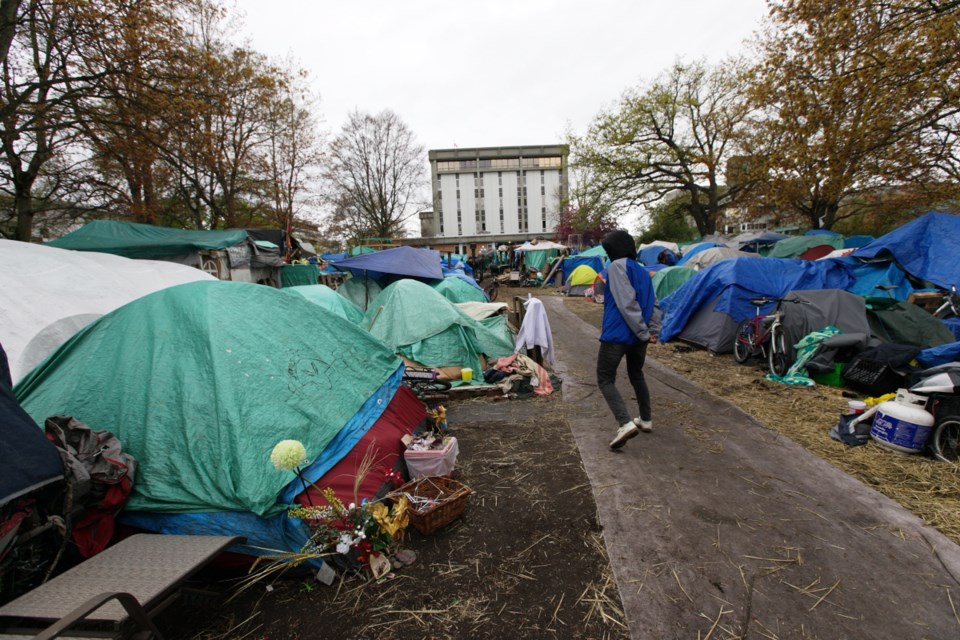 The big legal win by the courthouse campers confirms an impression that’s been growing for years. Homelessness is a fact of life, and no amount of shelter beds will ever alleviate the problem.
The big legal win by the courthouse campers confirms an impression that’s been growing for years. Homelessness is a fact of life, and no amount of shelter beds will ever alleviate the problem.
It’s an awkward, painful point to recognize in a land of plenty, which is why almost no politicians are ready to make it. But the specific legalities in this case and the law in general suggest the homeless will always be among us.
Chief Justice Christopher Hinkson’s decision not to order the courthouse shantytown shut down cements the impression it will be around for a long time to come, in some form. The ruling discounts most of the social problems people are complaining about, on grounds they arise from homelessness in general, not the camp in particular. It buys the campers several more months on the site.
A full trial of the issue isn’t scheduled until September. That will be expedited, but could still take a while to hear. It would take further weeks or months after that to reach a decision.
And even if the government wins, the judge noted that the province has no plans to block overnight sheltering by homeless individuals on the courthouse lawn between the hours of 7 p.m. and 7 a.m.
So, at a minimum, an evening congregation of campers could become a permanent part of the cityscape there from now on.
Hinkson said the balance of convenience is overwhelmingly in favour of the defendants, “who simply have nowhere to move to.” Evicting them from the courthouse lawn could result in their “constant disruption and a perpetuation of a relentless series for daily moves to the streets, doorways and parks.” He said the shelters now on offer are incapable of meeting the needs of some of them.
His judgment said many of the homeless cannot access those spaces that do exist for a variety of reasons. The new options created recently do not make spaces available to everyone. Those with high needs, or those who have problematic relationships with staff at other shelters, can’t use the spaces even if they do become available.
“Many of the current residents of the encampment have had extremely negative experiences in the current shelter system, where large groups of high-needs individuals crowded together with minimal support, and rigid rules regarding attendance make it difficult to secure or maintain a spot,” Hinkson wrote.
That position makes the argument over the actual number of homeless people almost irrelevant. There was conflicting testimony on the count. A B.C. Housing official estimated between 300 and 400 homeless in Victoria. A University of Victoria school of nursing professor and addictions researcher said it’s as high as 1,725.
The province has been insisting there are open shelter beds for anyone who wants them. That’s debatable, but even if it’s correct, the point is that some people don’t want them. And there’s no way to force them into the shelters.
After three days of hearings last month, the judge said he’s not satisfied that many of the alleged problems stem specifically from the existence of the encampment, as opposed to being “simply part of the reality of homelessness.”
A litany of complaints about damage and dangers was presented, dealing with crime, syringes, condoms, human waste and overdose deaths. The working estimate to clean up the site is $350,000. But those costs are already incurred and any further costs would be incurred somewhere else if the camp were shut down, said the ruling.
“If I were to issue the injunction at this point, I am concerned that the problems would simply migrate to other areas in the city of Victoria,” Hinkson wrote.
That could well cause greater disruption and greater expense than what’s currently being endured, he said.
Contrary to some of the protest signs you see at housing rallies, there is no charter right to housing. The same judge found as much in an Abbotsford case, and noted that fact in the Victoria ruling. But people do seem to have a right, within certain limits, to sleep where they please. The tone of the judgment indicates they’ll be doing just that for a long time to come.



